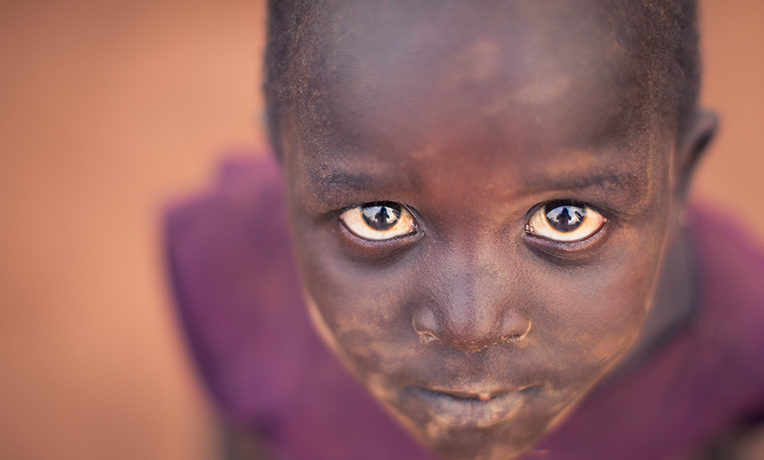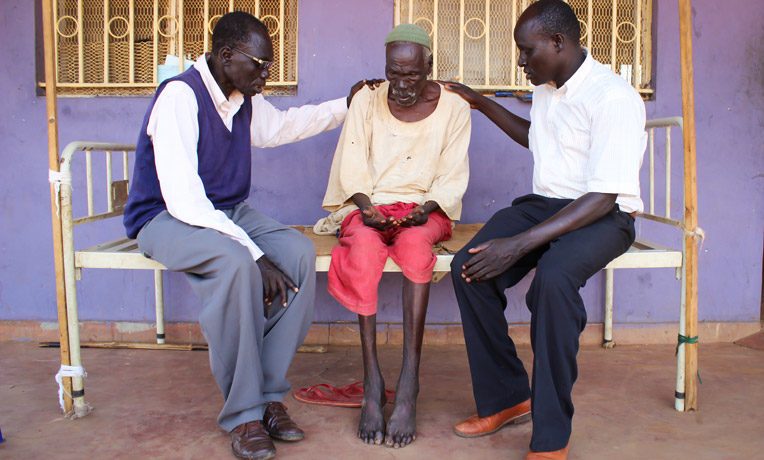Despite the risks, our teams are bringing relief in Jesus' Name throughout Maban County, helping refugees as well as host communities.
Struggling to breathe, Mohammed was admitted to Maban County Hospital in South Sudan. One evening during his stay, this refugee from Sudan’s Blue Nile region heard amazing news—of Lazarus being raised from the dead and of Jesus dying for our sins and rising from the dead.
Mohammed listened intently to the Gospel message shared by a local pastor volunteering with Samaritan’s Purse. Afterward, he said, “I have heard about Issa (Jesus). Now I want to surrender my life to Jesus.”
Mohammed began a new life in Jesus Christ that night and continues to learn God’s Word with other new believers.
Hospital Shines as Beacon of Hope
He is just one of many people who, by God’s grace, have found hope, health, and peace through the work of Samaritan’s Purse in Maban County. There we are distributing food, treating medical conditions, and caring for the souls of refugees and local residents.
Since November 2011, four refugee camps have been established in Maban to accommodate a large population of civilians displaced from ongoing violence in Blue Nile State. Samaritan’s Purse relocated its medical team to Maban County, near the Ethiopian border, to respond to the urgent needs of refugees and the host community.
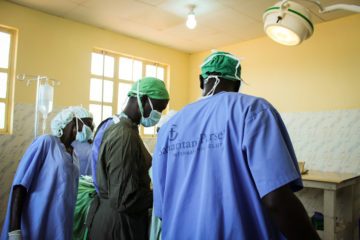
A Samaritan’s Purse medical team at Maban County Hospital, the only full-service referral health facility in the region.
“At first when I came to Maban, we had to do surgeries under a tree,” said Dr. Evan Atar, medical director for Samaritan’s Purse.
With permission of local leadership, the medical team set up operations in the vacant Bunj Primary Health Care Center, centrally located in Bunj town. We are providing lifesaving health services at what has since become the Maban County Hospital.
While there are primary health care clinics in the area, the 120-bed Maban County Hospital is a full-service referral health facility, the only one in the region in fact. Women deliver babies every week, an operating theater hosts hundreds of minor and major operations each month, parasite-borne illnesses like malaria are treated daily, and the pharmacy dispenses critical medication and non-prescription drugs to relieve aches and fevers or symptoms of minor illnesses.
Treating the Body, Caring for the Soul
A unique component to Samaritan’s Purse commitment to hospital patients and their families is a crisis-counseling program in partnership with local pastors. During the week, one or two pastors make rounds at the hospital—like doctors for the soul. They take time to listen to words flowing from hearts and bodies in pain, never rushing about but engaging in conversation.
Like they did with Mohammed, pastors encourage patients and their families with God’s Word, presenting them the hope found in Jesus Christ. In prayer, they faithfully carry patients’ burdens and worries to the Lord. So far this year, about 9,600 people have been ministered to through the crisis-counseling program at Maban County Hospital.
“We work together with our crisis counselors in ministering to the patients by praying with them and even try to help with other physical needs, like food and clothes,” explained Everlyne Owii, our health program manager. “Our team [including those who work in other projects] also visits the patients, praying together with them and sharing Christ’s love.”
“Our team visits the patients, praying with them and sharing Christ’s love.”
Twice weekly, Samaritan’s Purse staff lead devotions in the hospital, giving patients another opportunity to hear God’s Word and spend time prayer. Many patients have offered testimonies of how God has healed them while in the hospital. Others, like Mohammed, are hearing and responding to the Gospel of Jesus Christ for the first time.
“We see the Lord bless our work through the patients who walk out of the hospital well and happy,” Everlyne said. “They not only leave physically well but also with God’s Word. We have seen some receive Christ as their Savior.”
Multifaceted Ministry
The work of Samaritan’s Purse in Maban County, though, reaches far beyond the hospital walls.
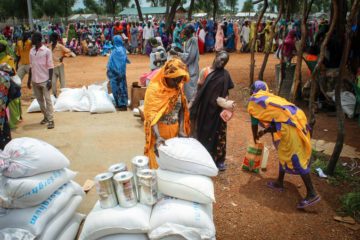
Refugees collect food rations during a distribution in their camp.
Earlier this year, some parts of South Sudan experienced famine levels of food insecurity. Maban County, though stressed and stretched, was spared more severe conditions due, in part, to the feeding programs we already had in place.
In partnership with the World Food Program (WFP), Samaritan’s Purse currently feeds more than 135,000 people each month in the host community and refugee camps, and another 13,000 young children and mothers receive food supplements through nutrition support.
“There has been steady and timely provision of feeding for the displaced communities in Maban, nutrition supplements for young children and mothers, and some of the sorghum distributed was used as seeds for growing stable food,” said Emmanuel Omoding, food assistance program manager with Samaritan’s Purse.
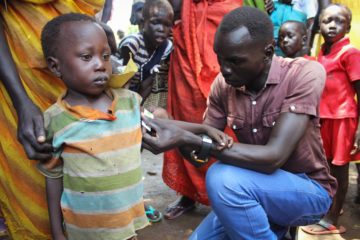
A child is screened for malnutrition in Maban County.
Martina, a 29-year-old pregnant mother of four, recently completed one of our programs, specifically designed to restore malnourished women. When she entered the program in March, she was sick, weak, and underweight.
In three months, she gained weight and strength, was taught how to prepare cereal, and learned how to better care for her own health and her family’s health in general.
“Martina is very happy she went through the program and is thankful for Samaritan’s Purse and WFP for offering the service,” Emmanuel said.
Persevering by God’s Grace
South Sudan has been wracked by violence in recent years. Yet while some localized conflict occasionally disrupts food distributions and other projects, the Maban County Hospital has never closed due to instability. The Samaritan’s Purse team presses on despite the risks.
“Maban has had a lot of challenges,” Emmanuel said, “but with the grace of God we continue to live and serve the affected communities here.”
